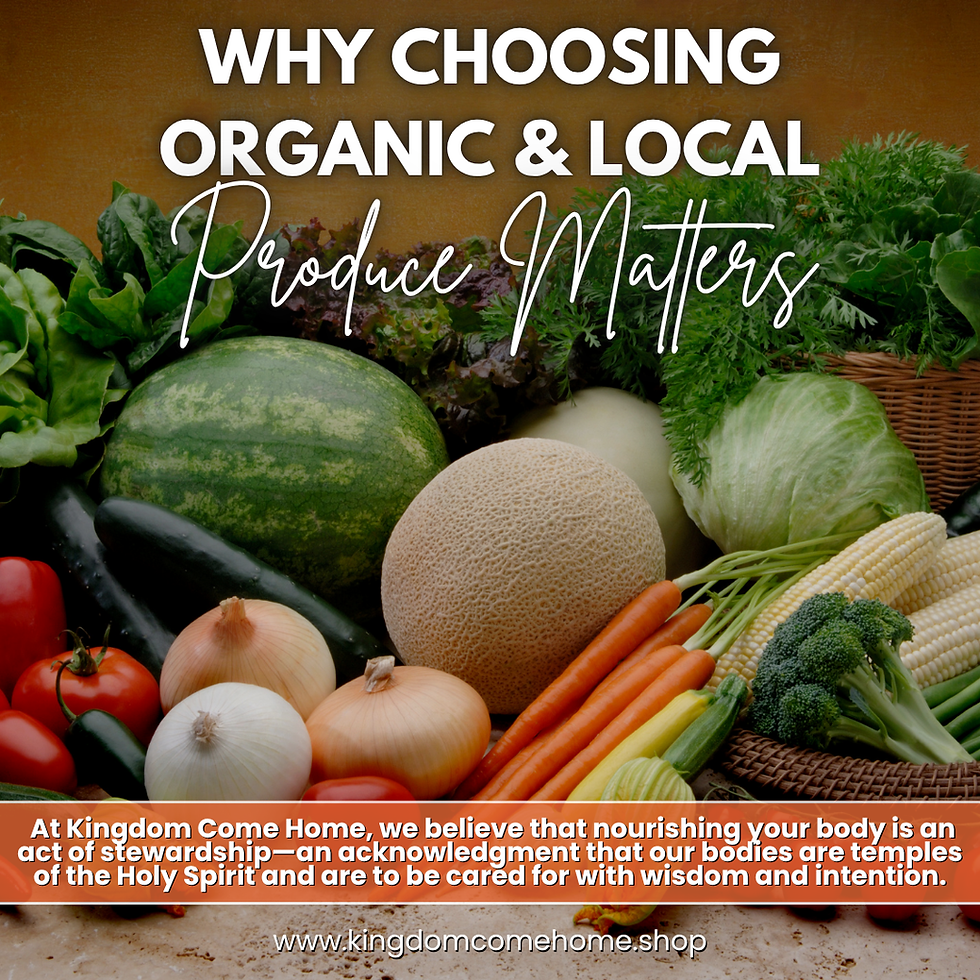Why Choosing Organic & Local Produce Matters: Biblical Wisdom for Nourishing the Body God Gave You
- Aug 8, 2025
- 4 min read

In a world where convenience often takes priority over purity, the food we put into our bodies is more important than ever. At Kingdom Come Home, we believe that nourishing your body is an act of stewardship—an acknowledgment that our bodies are temples of the Holy Spirit and are to be cared for with wisdom and intention.
“So whether you eat or drink or whatever you do, do it all for the glory of God.” – 1 Corinthians 10:31
Let’s dive into why buying organic and local produce is one of the most loving and protective choices you can make for yourself and your family, how to avoid harmful genetically modified foods, and what to do when organic isn’t an option.
The Benefits of Buying Organic Produce
Choosing organic means choosing produce that is grown without synthetic pesticides, herbicides, or genetically modified organisms (GMOs). This matters because what goes into the soil, water, and air eventually ends up in the foods we feed our families.
Organic produce is:
Free of harmful chemical residues
Higher in certain nutrients like antioxidants
Better for the environment and soil health
Supportive of pollinators like bees and butterflies
Non-GMO (genetically modified organisms are prohibited in organic farming)
“The Lord God took the man and put him in the Garden of Eden to work it and take care of it.” – Genesis 2:15
Buying organic is one way we honor God’s creation—by choosing food grown in ways that preserve the natural integrity of the land and the living things He designed.
The Blessings of Buying Local Produce
While organic is essential, local produce carries its own rich benefits. Supporting local farmers strengthens your community, reduces your carbon footprint, and gives you access to fresher, more nutrient-dense food.
Benefits of local produce include:
Picked at peak ripeness (which means better taste and nutrition)
Fewer preservatives and less packaging
Reduced transportation pollution
You can ask how it was grown—even if it’s not certified organic, many small farms use organic practices
Keeps your dollars circulating in your local economy
“You shall eat the fruit of the labor of your hands; you shall be blessed, and it shall be well with you.” – Psalm 128:2
Buying local is an act of community and care—a way to love your neighbor, steward your resources, and bless the hands that grow your food.

The Dangers of Genetically Modified Foods (GMOs)
Genetically modified foods are organisms whose DNA has been altered in ways that do not occur naturally. While some claim they increase food supply or resist pests, GMOs have raised major health and environmental concerns.
Risks and dangers include:
Increased allergenicity
Disruption of gut health
Unknown long-term health effects
Heavy use of glyphosate and other toxic herbicides
Cross-contamination with organic crops
Environmental harm to soil and pollinators
“Do not conform to the pattern of this world, but be transformed by the renewing of your mind.” – Romans 12:2
As believers, we are called to be discerning. Choosing real, whole, God-designed foods over modified alternatives is one way we honor the design and order He created.
The “Dirty Dozen”: What You Should Always Buy Organic
When buying 100% organic isn’t possible, focus on buying organic versions of the “Dirty Dozen”—the top 12 fruits and vegetables that carry the highest levels of pesticide residue when conventionally grown:
Strawberries
Spinach
Kale, collard & mustard greens
Grapes
Peaches
Pears
Nectarines
Apples
Bell & hot peppers
Cherries
Blueberries
Green beans
“The wise store up knowledge, but the mouth of a fool invites ruin.” – Proverbs 10:14
Choosing organic for these high-risk items is a smart step to protect your body from the cumulative effects of chemical exposure.
How to Wash Non-Organic Produce the Holistic Way
Sometimes organic isn’t available or affordable—and that’s okay. When you do purchase conventional produce, you can reduce surface pesticides and residues with a simple, holistic produce bath.
DIY Natural Produce Wash:
Ingredients:
4 cups filtered water
1 cup white vinegar
1 tablespoon baking soda
Juice of 1 lemon (optional for scent and extra cleansing)
Instructions:
In a clean sink or large bowl, combine all ingredients.
Add produce and let soak for 10–15 minutes.
Rinse thoroughly with clean, cold water.
Let air dry or pat dry before storing.
This method helps remove wax, pesticide residues, and bacteria—without adding more chemicals.
“Cleanse me with hyssop, and I will be clean; wash me, and I will be whiter than snow.” – Psalm 51:7
Just like our hearts, sometimes our food needs a good cleansing. This simple wash is one more way to care for your family holistically and honor your body as the temple it is.
A Kingdom Approach to Food
Every bite we take is an opportunity to steward our health, honor creation, and fuel our purpose. Whether you’re buying from a local farm stand, picking up organic produce at the grocery store, or washing your fruits and veggies with a natural rinse—your choices matter.
“Beloved, I pray that you may prosper in all things and be in health, just as your soul prospers.” – 3 John 1:2
We were created to thrive—not just survive. And when we align our habits with the wisdom of God and the rhythm of His creation, we flourish.
Blessings,
Heidi Davis
Co-Founder with Holy Spirit
Kingdom Come Home

Comments